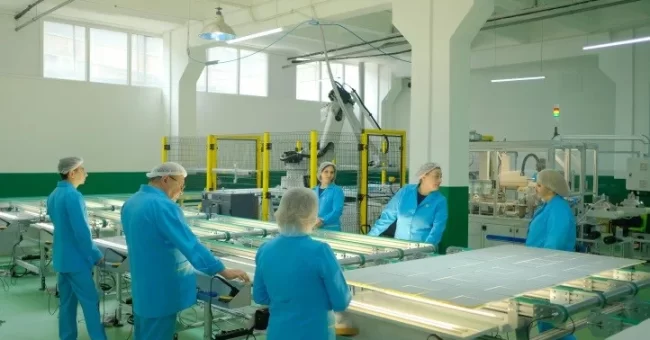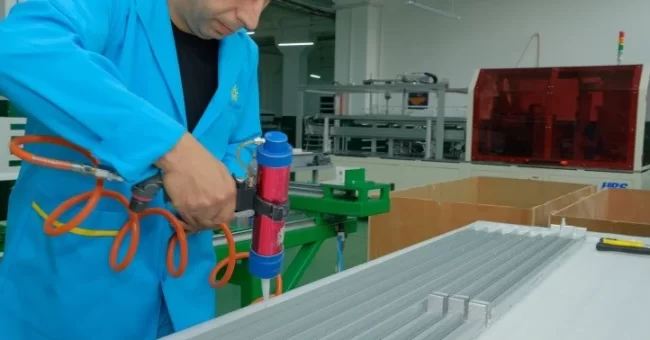Menu
X

Our annual production capacity of solar panels is 60 MW.

Solaron manufactures Monocrystalline, Polycrystalline, Perc, double glass, and half-cut Solar Modules.

During production, each solar module undergoes four phases of testing using high-quality equipment, ensuring that 100% of the modules meet international standards.

Solaron possesses the expertise and resources to provide turnkey solutions for industrial facilities, public spaces, private residences, and government installations.

Our proficiency as a solar panel manufacturer allows us to meet the demands of our clients by producing and delivering panels and accompanying equipment with remarkable speed and efficiency.

We stand behind the quality of our products and provide a warranty, taking full responsibility for our production and every product we sell.
Our production process follows international standards, which allows us to adapt to customer requirements while offering high-quality products. In 2017, Solaron became the first Armenian company to begin mass production of photovoltaic solar panels., For this purpose, we have established long-term partnerships with organizations and research centers in the EU and China.
Solaron produces solar panels at its own modern production facilities located in Yerevan. To ensure the production of high-quality solar panels, the company has invested in a modern and innovative production line from the renowned Italian company Ecoprogetti. This production line significantly automates the production process and significantly increases production capacity.

We can produce solar modules with a wide range of characteristics, which differ both in the type of cells used and their number, but the basis of our production is already a standard panel consisting of 72/96 Mono PERC cells. Our product portfolio includes a wide range of solar modules such as monocrystalline PERC, Bifacial, and half-cut modules based on standards (“butterfly”) and cross-string topology.
We continuously strive to expand our product line in an organic manner, keeping up with the latest trends and adopting new approaches in the industry. This ensures that we can offer a diverse selection of solar panels that meet our customers’ evolving needs and preferences.
In addition, we have the capability to produce both standard and non-standard solutions to meet the specific needs of our customers. We understand that every project is unique, and we are committed to providing tailored solutions that align with the individual requirements and preferences of our clients. Whether it’s a customized size, special design, or specific technical specifications, we have the flexibility and expertise to deliver solar panels that cater to our customers’ exact requirements. Our goal is to offer not only a wide range of pre-designed modules but also the ability to create bespoke solutions that address the diverse and evolving demands of the solar industry.

Cells are the main component and have the function of capturing sunlight and convert it into electricity. Crystalline cells can be monocrystalline or polycrystalline, according to their manufacturing process. This however does not affect the PV module production process. The main technical characteristics are size, color, number of bus bars, and above all the conversion efficiency.
The front glass is the heaviest part of the photovoltaic module and it has the function of protecting and ensuring robustness to the entire photovoltaic module, maintaining a high transparency. The thickness of this layer is usually 3.2mm but it can range from 2mm to 4mm depending on the type of glass chosen. It is important to pay attention to features such as the quality of hardening, spectral transmittance, and light transmittance.
The term backsheet literally means the sheet on the back. It is made from a plastic material that has the function of electrically isolating, protecting, and shielding the PV cells from weather and moisture. This particular sheet is usually white in color and is sold in rolls or sheets. There are particular versions that can be different in thickness, color, and in the presence of particular materials for greater shielding or for higher mechanical strength.
One of the most important materials is the encapsulant, which acts as a binder between the various layers of the PV panel. The most common material used as an encapsulant is EVA – Ethylene vinyl acetate. It is a translucent polymer sold in a roll. It must be cut into sheets and deposited before and after the photovoltaic cells.
One of the last parts to be assembled is the frame. It is normally made of anodized aluminum and has the function of ensuring robustness and a practical and safe coupling to the photovoltaic module. Together with the frame, also a layer of sealant is deposited around the walls of the panel as a moisture barrier. For this purpose, the most widely used material is silicon, although sometimes a special sealing tape is used
The junction box has the function of bringing the electrical connections of the PV module outside. It contains the bypass diodes for shadows and the cables with connection terminals for the connection of the panels in the field. In choosing the Junction box we pay attention to the quality of plastic, the goodness of sealing, the type of connection of the ribbon, and the quality of bypass diodes.
Yes, Solaron was founded in 2016, becoming the first company producing solar panels in Armenia. Our assembly line completely meets all international quality standards.
Yes, all our products have ISO 45001, 9001, 14001, and many other International certificates.
All our products go through 4 stages of control. From the very first moment of the production process, the panels go through the stages of quality, strength, durability, and efficiency testing.
All panels manufactured at Solaron are tested using an artificial solar simulation, during which all their parameters are specified and checked.
Our solar panels have a 30-year warranty, but with proper operation and maintenance can last longer.
Our factory is located in Yerevan: You can find us at 25/1 Arshakunyats Street.

Please, leave us your details and
we will get back to you soon